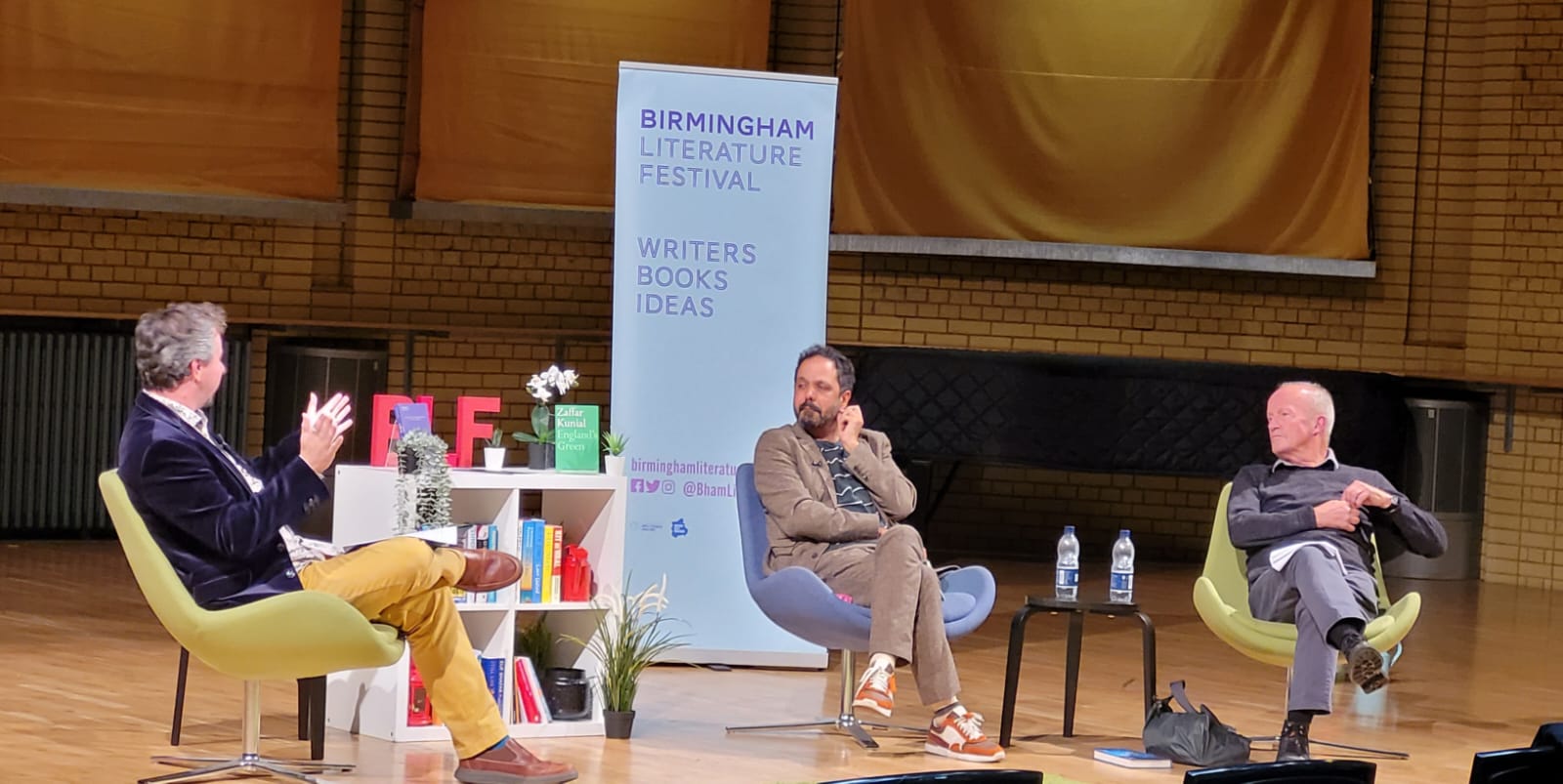Crace / Kunial : poetry / Prose
One of the more interesting events among Birmingham Literature Festival’s National Poetry Day programming was a conversation between a prose writer and poet designed to unpick some of the workings behind the two. I’d seen Jim Crace a few times before and am fond of his hilarious, sweeping statements and insightful expositions of craft. [1] I’d never seen Zaffar Kunial, but the few poems I’d seen online / in magazines were sharp and contained celebrations of an idiolect I hadn’t related to Birmingham before.
The part of the conversation that caught me up most was in the differences between poetry and prose. Crace offered interesting examples from Kingsley Amis and Philip Larkin, both using the word ‘fastidious’ to describe their relationship to writing poetry (in explaining Larkin’s shift from prose to poetry and Amis’ shift in the other direction). I don’t really appreciate the message from either of those writers, given their misanthropic elitism, but it did shift me toward an underlying vein of thinking, captured partially in how Kunial responded, rather than what he said.
Kunial came across as instinctive, unselfconscious in his writing. He spoke to the function of poetry in his life. I.e., it was a subjective urge, without recourse to objective taxonomies.
The problem I find in a certain kind of thinking about writing, is the desire to capture (without exposing desire’s subjectivity) what something is. What is a poem? What is a novel? These lead to redundant outcomes. Interestingly, Crace also discussed how Kunial’s poetry had moved him, made him read and think. The subjectivity of that, alongside a kind of old school validation of literary taxonomies and statements of poetics, stand at odds.
For me it’s the why of a poem or story. Why does an idea fall into the pattern of poetry or prose? What can each enable? Crace was precise on his own use of the novel: a one-off narration designed to bring meaning to events described, reflecting back on the world through parallels of between experiences had by the story’s characters and readers.
Kunial was less overt about the function of poetry, but, at least for the purpose of the event’s discussion and focus, he was exploring past experiences, growing up in Birmingham, exploring language. Yet he also did his best to point out the extra hinterland of meaning and content covered. He actually avoided reading poems set in the Midlands, focusing on the wider material.
That to me hints at poetry’s function in relation to prose. I turn to poetry when I don’t know what something means – shoring up fragments of experience so I can survey all the possible layers of meaning that might emerge. That modernist idea of poetry being charged with multiple meanings isn’t about hardening those experiences into singular, or linear ahas! through recollection. It’s a way of processing my experiences so I can see them again, better, differently, hold them up to people and have myself accounted for.
Prose – at least the version held up by Crace – is a way of making sense, for me, in a given, narrative direction, of experience, playing out possibilities almost like an argument. Yet the strategic possibilities for making meaning in narrative narrow down as the arc progresses, given the contexts and constraints of the characters and locations involved. Rather than opening meaning, a novel serves as a way of coming to terms with or resolving one, or a limited handful of threads, in directions unexpected (e.g. writing what you know to get to what you didn’t).
This may be somewhat awkwardly expressed. It’s not to say ‘the novel as a form is this‘, or that a poem is that, but they have the potential for, in my writing. Just as I have to keep reminding myself, a blog is a space to explore, make mistakes, capture a process of thinking that might otherwise be lost, in a semi-public space, and I don’t have to work so hard at the polishing as I might in an essay.
—
[1] Around 20 yrs ago – on tour for his novel Sixx, I think – he said he would never write another novel ever again, but would instead retire into grand-parenting and his greenhouse. At his next novel tour, he talked about the first person present tense in novel writing as being like ‘walking a tightrope with the reader’, or something similar. At a later event, more personal and targeting writing students, he discussed his editing process and the use of a ‘cruel pen’ to hack his first drafts into shape. He’s extremely good with metaphors about craft, and very honest, even with his own contradictions.

